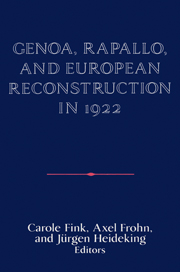Book contents
- Frontmatter
- Introduction
- 1 Beyond Revisionism: The Genoa Conference of 1922
- 2 The Genoa Conference of 1922: Lloyd George and the Politics of Recognition
- 3 A Rainy Day, April 16, 1922: The Rapallo Treaty and the Cloudy Perspective for German Foreign Policy
- 4 Reparations in 1922
- 5 Germany and the United States: The Concept of World Economic Interdependence
- 6 American Policy Toward Debts and Reconstruction at Genoa, 1922
- 7 French Plans for the Reconstruction of Russia: A History and Evaluation
- 8 The Oil Problem and Soviet-American Relations at the Genoa Conference of 1922
- 9 Italy at the Genoa Conference: Italian-Soviet Commercial Relations
- 10 The European Policy of Czechoslovakia on the Eve of the Genoa Conference of 1922
- 11 The Genoa Conference and the Little Entente
- 12 The Role of Switzerland and the Neutral States at the Genoa Conference
- 13 The Genoa Conference and Japan: A Lesson in Great-Power Diplomacy
- Maps
- Appendix
- Bibliography
- Contributors
- Index
11 - The Genoa Conference and the Little Entente
Published online by Cambridge University Press: 05 January 2013
- Frontmatter
- Introduction
- 1 Beyond Revisionism: The Genoa Conference of 1922
- 2 The Genoa Conference of 1922: Lloyd George and the Politics of Recognition
- 3 A Rainy Day, April 16, 1922: The Rapallo Treaty and the Cloudy Perspective for German Foreign Policy
- 4 Reparations in 1922
- 5 Germany and the United States: The Concept of World Economic Interdependence
- 6 American Policy Toward Debts and Reconstruction at Genoa, 1922
- 7 French Plans for the Reconstruction of Russia: A History and Evaluation
- 8 The Oil Problem and Soviet-American Relations at the Genoa Conference of 1922
- 9 Italy at the Genoa Conference: Italian-Soviet Commercial Relations
- 10 The European Policy of Czechoslovakia on the Eve of the Genoa Conference of 1922
- 11 The Genoa Conference and the Little Entente
- 12 The Role of Switzerland and the Neutral States at the Genoa Conference
- 13 The Genoa Conference and Japan: A Lesson in Great-Power Diplomacy
- Maps
- Appendix
- Bibliography
- Contributors
- Index
Summary
The role of the Little Entente at the Genoa Conference has not yet been explored. The books that have been written about the conference merely hint at it. We know relatively more about the role of Czechoslovakia because there is a work devoted exclusively to this. However, its author was not able to consult either the published British records or the documentation on the Bucharest and Belgrade meetings, which, although not yet available, is indispensable for an objective analysis. The problems treated at these two preliminary meetings, the viewpoints represented there, and the debates among the participants are still scarcely known. The sources found in the archives of Prague, Budapest, and Paris only partially fill this gap, and the official published statements of the time are not completely reliable.
This study is based on sources in the archives of Czechoslovakia, Hungary, and France, on the published British documents, and on other publications dealing with the Genoa Conference. I shall try to offer a broad, nuanced picture of the role of the Little Entente and its individual members at the Genoa Conference.
It becomes clear from the documents that there was a strong duality in the policy of the Little Entente toward the Genoa Conference and its antecedents. In general, its views were closer to those of France than to those of Great Britain, but the members of the Little Entente were also acutely sensitive about their relationship with London.
- Type
- Chapter
- Information
- Genoa, Rapallo, and European Reconstruction in 1922 , pp. 187 - 200Publisher: Cambridge University PressPrint publication year: 1991

